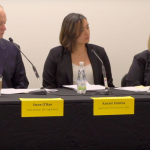How do we fund public defenders?
April 26, elected officials met with UW Tacoma students and alumni at the University Y to discuss the importance of public defenders and issues the public defense system faces.
Sitting on the panel were Sen. Steve O’Ban, Pierce County Councilman Derek Young, Superior Court Judge Elizabeth Martin and Kanani Palafox — a UWT alumna and legal assistant in the Pierce County Prosecutor’s Office. Students were encouraged to attend the event in order to ask questions and find potential solutions to the issues raised. About 60 people attended the event including students, staff and community members.
The landmark Supreme Court case Gideon v. Wainwright established the need for states to have a public defense system. In other words, because of Gideon v. Wainwright, we now have state funded public defenders for criminal proceedings. Though this case established a need and a constitutional right for public defenders, it never guaranteed an official budget to fund public defenders. Therefore, lawmakers have had to adjust budgets to make room for the court’s mandate.
UWT professor Katie Baird organized the event after reading a Tacoma News Tribune Op-Ed by Young where he argued that Washington needs further funding for public defenders. The goal of the panel was to find real solutions and plans of action to this financing problem.
Johanna Hopper, student staff for the politics, philosophy and public affairs major, and event contributor, explained the idea of the panel further.
“We already fund public defenders,” Hopper said. “This panel discussion is honing in on the challenge of the unfunded mandate: funding issues that leave counties struggling to come up with enough money to keep this system afloat.”
According to Hopper and O’Ban, fixing the dilemma of an unfunded mandate would effectively help those who are most vulnerable in our legal system.
“Those who cannot afford defense attorneys either face long waits for council or are assigned representatives who are exhausted and overburdened, but again, the ripple effect of this funding challenge is significant,” Hopper said.
Panelists tried to tackle the issue, noting the roadblocks in the path to solving the problem. O’Ban and Young emphasized how competing priorities are of great concern. Mental health, the drug crisis and homelessness in the Pacific Northwest were all issues discussed on the panel. They identified the biggest issue, however, as deciding which issue to fund first.
“These particular issues, [mental health, the drug crisis and homelessness,] represent part of a vicious cycle, since they increase the burden on the criminal justice system, which in turn takes funding away from the services that would otherwise address the root issue,” Hopper said.
Martin expressed the need for a change in the criminal justice system.
“[People] may not understand the value that comes from an adequate system … it’s not just somebody you don’t know,” Martin said. “Everyone is harmed by a system that does not work.”
Her sentiment was echoed by several others, including O’Ban and Young.
“We’re in a position where we’re not going to let our constitutional obligation to our citizens fall,” Young said. “If [legislators] hear from their citizens that you want a more just system … we may be able to make a little progress.”
Other solutions proposed involved diverting people away from the criminal justice system all together, as mentioned by Dawn Farina from the Pierce County Prosecutor’s Office.
“We continue to come up with innovative ways to not charge these low-level cases and to divert them into programs that are gonna help these individuals lead productive lives,” Farina said.




